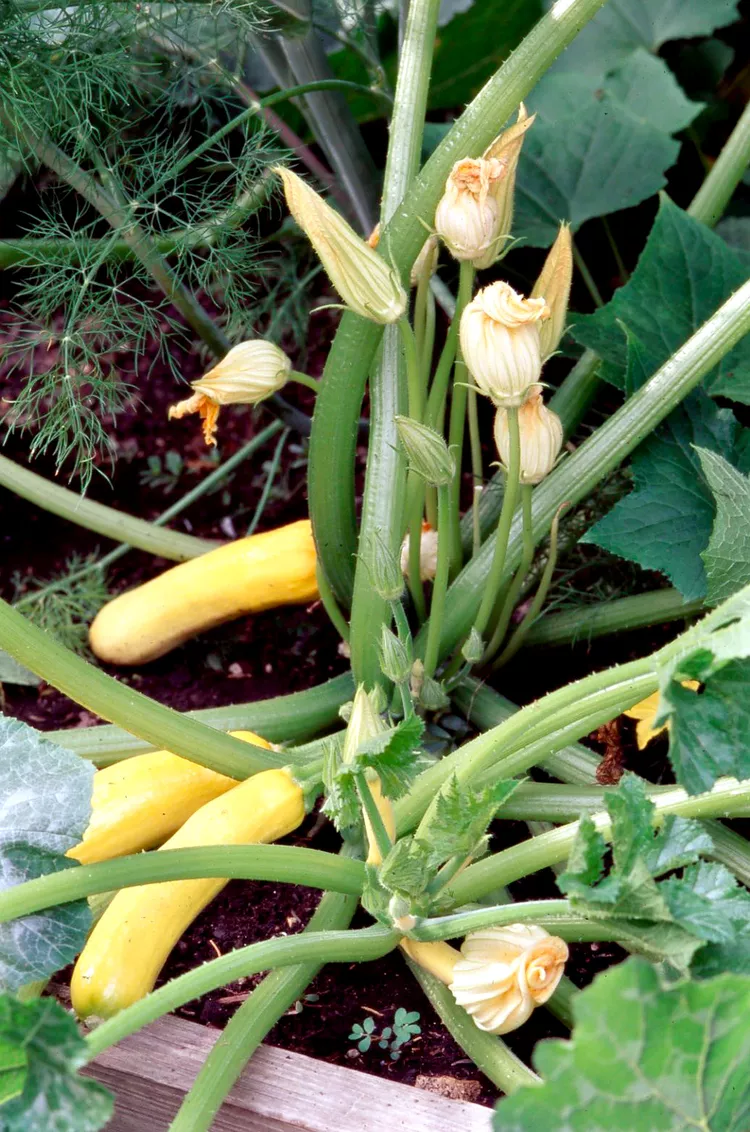9 Best Companion Plants for Squash

From acorn squash to zucchini, you've got lots of squash plants to choose from when planning out your garden. These plants tend to be very prolific, but squash can often struggle to fruit due to lack of pollination, and they can become infested with pests like squash bugs. One easy way to prevent both of these issues is by companion planting squash with helpful plant partners. Doing so can boost the health of squash vines and help you grow armloads of fresh summer squash and winter squash for your table.
Corn
Companion planting squash with corn is part of a traditional plant partnership known as the “Three Sisters,” which was first developed by the peoples of the First Nations. In this plant pairing, corn provides extra shade for squash plants and, in turn, squash leaves act as a living mulch for the corn, sheltering the soil and preventing weeds from creeping in. In the Three Sisters method, winter squash is most commonly grown with corn; however, summer squash will also work and smaller vining squash plants may be able to use cornstalks as a natural trellis.
Beans and Peas
Pole beans are the “other sister” in the Three Sisters method and they are frequently grown with corn and squash due to their nitrogen-fixing abilities. When tilled into the soil, both beans and peas can improve the soil quality and increase the amount of nitrogen in your garden, which plants need for healthy development. Even better, beans and peas can use the same trellising system as climbing squash plants, saving space in your garden and helping you get more use out of your trellises.
Sunflowers
Like corn, sunflowers provide extra shade in the garden and shelter squash leaves and fruit from the harsh summer sun. Smaller squash varieties may also be able to use sunflowers for trellising, while prickly squash stems help discourage raccoons from gobbling up your sunflower seeds. Sunflowers are also one of the top plants to grow for pollinators and planting them near squash plants will ensure your squash blossoms always get pollinated.
Marjoram
Squash bugs are often found congregating on squash leaves and fruit. After invading, squash bugs begin to suck the juice from garden plants and they can leave stippling patterns on plant leaves and cause vines to wilt and collapse. As devastating as these pests can be, companion planting squash with marjoram deters squash bugs from invading and will help keep your garden pest free.
Dill
Dill is another fragrant herb that can also repel squash bugs and other pest insects too. Planting dill around your squash and other vegetables can attract predatory wasps to your garden that will feed on a wide range of insects. Additionally, dill is an essential host plant for swallowtail butterflies and allowing it to flower in your garden can boost the pollination rates of your squash blossoms.
Radishes
Radishes are vigorous plants that can be harvested in just 21 days. Interplanting squash with radishes will put the empty soil beneath squash vines to good use and it will provide you with a tasty harvest of fresh veggies while you’re waiting for your squash plants to ripen. What’s more, radishes can act as an effective trap crop for flea beetles and companion planting with radishes can also reduce squash vine borer populations.
Mint
Many different pests hate the scent of mint plants and growing it in your garden can repel insects like flea beetles and squash bugs. Deer and rodents also don’t like mint’s fresh fragrance, so if deer frequent your garden or you notice burrow holes from ground squirrels, you may want to plant some mint. However, mint grows incredibly vigorously and it can drown out slower growing plants. To avoid this, consider growing mint in pots placed throughout your garden and check the pots from time to time to make sure mint plants aren’t sending out runners through the pot’s drainage holes.
Borage
Squash plants rely on insect pollinators to fruit, but when pollinators are absent, squash vines will often produce flowers but no fruit. One way to remedy this is to increase pollinator activity in your garden by growing flowers that bees and other beneficial insects can’t resist. Borage flowers are favorites among bees and growing these plants near your squash can boost your squash harvest. Borage plants also have charming, edible flowers and leaves, which make colorful salad toppers and garnishes too.
Garlic
When interplanted in vegetable gardens, garlic and other allium plants emit a strong scent that’s ideal for repelling an assortment of pests. Whether you’re struggling with squash bugs, aphids, or deer, using garlic as a companion plant is a surefire way to reduce pest activity in your garden. Just remember that garlic is generally planted in the autumn and harvested the following summer, so you will need to plan ahead if you want to use this squash companion plant.
Companion planting has so many uses. It can keep pests out of your garden, increase pollinator activity, and even improve the look of your garden space. Whether you have a large, inground garden or a small space, vertical garden, make room for these companion plants for squash to enjoy all these benefits.